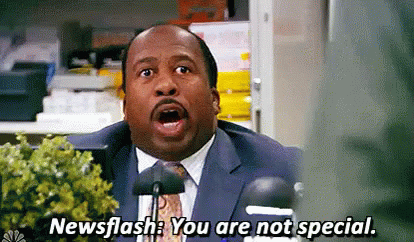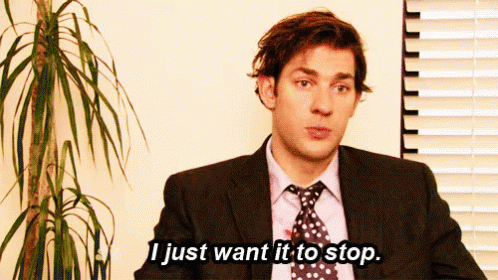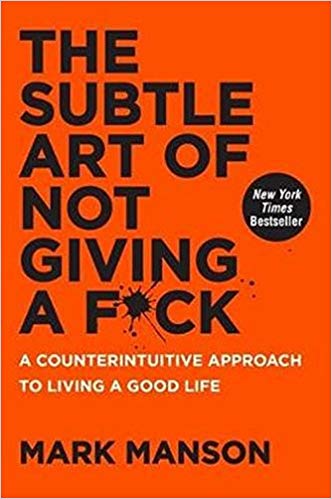The Subtle Art of Not Giving a F*ck
Overview
- What is your legacy?
- "What if I'm wrong?" isn't helpful if you don't ask "what would it mean if I'm wrong?"
- Do something and the answers will follow
- Choose what you care about
- You choose your pile of crap. Learn to sustain the pain you've chosen
- Ask yourself "why?" to walk through problems.
- Acknowledge failure and its benefits
- Determine your values and metrics by which they are measured
- Uncertainty is a good thing since it is at the root of progress and growth
- Choose what you care about and don't care about what you don't value
- You can't get away from problems—you can only trade up to better problems.
- Through pain often come life's most profound moments
- Just because you ask yourself if you're wrong doesn't mean that you are
- Doubt your conclusions—strive to be less wrong today than you were yesterday.
1: Don't try
Typical self help advice and books ask you to care about everything. They want you to focus on success and on the positive because that tells you what you lack and therefore what you need (and more often than not "buy"). It consequently makes you feel like crap because you're essentially focusing on what you lack and chasing a mirage of satisfaction. The more you pursue feeling better all the time the less satisfied you become. Don't try.
Oftentimes we feel bad for feeling bad or anxious for feeling anxious. We feel guilty for every mistake because we're always worried about doing the right thing. That is the Feedback Loop from Hell. People believe that having negative experiences is not ok. That they should feel bad for having them and that they should feel good all the time. Fortunately and unfortunately, bad experiences are a part of life and they are often the experiences that help us grow the most. Without the bad you have no context for what is good. To try to avoid pain is to give too many f's about pain. No matter where you go there will always be a load of crap to deal with. You just have to choose which load of crap you want to deal with. It's ok for things to suck sometimes—that's normal.
The key to adversity is learning how to be resilient so that you can bear it.
The desire for more positive experience is itself a negative experience. And, paradoxically, the acceptance of on'es negative experience is itself a positive experience.
The Backwards Law: Sometimes the less you care about something the better you do at it. Pursuing the positive is negative and pursuing the negative is positive. e.g. pursuing the negative in the gym—pain—results in the positive.
Everything worthwile in life is won through surmounting the associated negative experience.
To not give a f is to stare down life's most terrifying and difficult challenges and still take action.
The Subtleties:
- It doesn't mean being indifferent it means being ok with being different. There's no such thing as not giving an f—everyone has to choose to give an f about something. F everything unimportant in life.
- You must care about something greater than adversity to not give an f about it. Finding something important and meaningful to work on is one of your most important tasks.
- You are always choosing what to give an f about.
2: Happiness is a Problem

Life is a form of suffering whether you are rich or poor since both have different problems that they must deal with. Happiness is not algorithmic since dissatisfaction and unease are a necessary component to drive change. The dissatisfied and insecure and the ones that will drive the innovation.
We are wired to become dissatisfied with whatever we have. Problems never go away, they just improve. Hope for a life of good problems not one void of any problems.
Happiness, fulfillment, and meaning require struggle.
Coddling oneself or a group doesn't allow them to experience the benefits of healthy doses of pain. Happiness comes from solving problems and therefore happiness is dependent on having problems you enjoy solving. What pain do you want to sustain? What are you willing to struggle for? What problems would you rather solve? Who you are and your success is defined by what you are willing to struggle for.
Your problems are more than likely not special. If you feel like you have problems that you can't solve then your going to make yourself unnecessarily miserable. There's often a solution within your power to any problem.
Two things get in the way of solving problems. They're essentially emotional highs since they're quick and easy:
- Denial
- Denying reality. Leads to a life of insecurity, neuroticism, and emotional oppression.
- Victim mentality
- Blaiming others or outside circumstances for problems.
These highs generate addiction.
Emotions are feedback mechanisms—suggestions as to the right or wrong of something. Negative emotions are a call to action while positive emotions are a reward. Denying emotions means denying the feedback mechanism while, conversely, overidentification means giving them too much weight (i.e. they're more than a suggestion) and letting them control you. The hedonic treadmill.
The solution lies in the acceptance and active engagement of the negative experience—not the avoidance of it. The path to happiness is full of crap heaps and shame.
3: You Are Not Special

Everyone cannot be massively successful or exceptional—the math just doesn't work no matter how positive you are. Our culture has been coddled so that everyone must be seen as a success, given trophies. Adversity and failure are necessary for developing strong-minded and successful adults. The extremes get the publicity but the truth is that most of us are average. We often don't feel good enough and thus insecure because of all of the exceptional information that is passed around.
The inundation of the exceptional makes people feel worse about themselves…[and]…[overexposes] us to the unrealistic standards we fail to live up to. Being "average" has become the new standard of failure.
People become truly exceptional because they are obsessed with improvement and are willing to accept that they are not that great at all yet and put in the work necessary to improve—anti-entitlement.
Most often people measure their self-esteem based on how positively they felt about themselves. But a more accurate representation is how people feel about their negative aspects. The truth is that the vast majority of life is boring and that your actions don't make that big of a difference in the grand scheme of things. If you accept the fact of your own mundane existance then you will be freed from slavery to "everything must be exceptional" and thus be able to accomplish without lofty expectations. You will have a growing appreciation for life's basic experiences. But this is good since the ordinary experiences are those that commonly matter the most.
Entitlement: people feel as though they deserve things without earning them. That they deserve to feel good without going through the pain to necessary for achievement and happiness. They exude a delusional level of self-confidence and that they're accomplishing great things when they're not. They bill themselves as "life coaches" even though they're only in their twenties and haven't accomplished anything.
Entitlement plays out in one of two ways: I'm awesome or I suck since both "deserve" special treatment. Entitled people will often flip back and forth between the two. Entitlement is a failed strategy since it is just another high. Often they can't face their own problems since they are weak and incapable of acknowledging their own problems open and honestly. A person with high self-worth is able to look at their negative attributes frankly and act to improve them.
People who are self-aggrandizing or self-important and narcissistic are extremely hard to break out of this cycle. They are so insecure that everything is either an affirmation of or a threat to their own greatness. Craving for validation often morphs into a mental habit of self-aggrandizing.
The assumed inability to solve our problems causes us to feel miserable and helpless. If we have problems that are unsolvable, then we're either uniquely special or uniquely defective and thus entitled since the rules must be different since we're unlike anyone else.
There's no such thing as a personal problem. You're not special or unique but that doesn't mean that it won't hurt or that the problem should be minimized. It also doesn't mean that you aren't legitimately a victim in some circumstances.
You and your problems are not privileged in their severity or pain—that is the first and most important step toward solving them. The deeper the pain, the more helpless we feel against our problems, and the more entitlement we adopt to compensate for those problems.
4: The Value of Suffering

The question we should be asking is not "How do I stop suffering?" but "Why am I suffering—for what purpose?"
You can often choose how you suffer but not if you suffer since that is a given in life. Oftentimes people choose to dedicate their lives to what appear to be useless or destructive causes.
Self-Awareness Onion and the Why Questions
-
First layer: a simple understanding of one's emotions and how the states come about (x makes me happy or sad)
- We have emotional blind spots which often have to do with emotions that were taught were inappropriate when growing up. It is very important to uncover those blind spots and then to do something.
-
Second layer: the ability to ask why we feel certain emotions
- Helps to identify the root cause. Once that is uncovered then you can work to change and or improve it
-
Third layer: personal values or rather "Why do I consider this to be a success/failure?"
- How am I choosing to measure myself? This takes constant questioning and effort.
- Our values determine the nature of our problems and the nature of our problems determines the quality of our lives.
- If our personal values are out of whack then everything that relies upon will be as well. This includes how we view success or failure since how we think or feel about a situation depends upon how we perceive it. Your perceptions or feelings may change but your values typically don't.
- People often avoid the why questions and this passes as self-awareness when they're really avoiding responsibility for their own problems.
- The more uncomfortable the answer to the Why questions the more likely it is to be true.
- By what standard do we measure ourselves? Our values determine the metrics by which we measure ourselves and everyone else.
- To change how you see your problems, you must first change your values or how you measure success.
Asking the Why Questions & Values/Metrics
- Think of something that is really bugging you and then ask why it bugs you
- Likely there will be a failure of some sort
- Then ask why it seems "true" to you?
- Then ask why does this feel like a failure (or X state, this step may not be needed since you can repeat 2)?"
- Also ask what else could be true that I'm not considering?
Dig deeper by repeating the process. You will often see that there are metrics and values that are operating beneath the serface
What is objectively true about your situation is not as important as how you come to see the situation. Problems may be inevitable, but the meaning of each problem is not. We get to control what our problems mean based on how we choose to think about them.
Good vs Bad Values And Ones That Create Poor Problems
Good Values: 1. based on reality, 2. socially constructive, and 3. immediate and controllable. Achieved internally.
Bad Values: 1. superstitious, 2. socially destructive, and 3. not immediate or controllable. Generally reliant on external events and thus outside of your control.
Popularity is a bad value whereas honesty is a good value.
Values are about prioritization and thus they affect your decision making. When we have poor values, we're giving f's about the things that don't matter. Self-improvement is really about prioritizing better values so that you give an f about the things that really matter.
As a rule, people who are terrified of what others think about them are actually terrified of all the shitty things they think about themselves being reflected back at them
- Pleasure
- Most superficial form of life satisfaction. Pleasure is not the cause of happiness it is the effect.
- Material Success
- Once one is able to take care of basic needs the correlation between happiness and monetary renumeration deminishes rapidly.
- People tend to be assholes when they measure themselves by their status symbols and not their behavior
- Always Being Right
- We're consistently wrong through poor assumptions, misjudgements, memory issues, cognitive biases, and emotions.
- To believe—conciously or unconcious—that we're always right doesn't allow us to learn from our mistakes.
- It's best to assume we don't know a whole lot
- Staying Positive
- Sometimes life sucks and the best thing to do is to just admit it.
- Denying emotions through constant positivity is avoidance of life's problems and not a valid solution.
- Negative emotions are a necessary component of emotional health. Anger is natural and is not the problem. Punching someone is.
- Denying negative emotions denies our problems which means that we deny the ability to solve them and to generate happiness, meaning, and importance.
- How to deal with negative emotions
- Express them in a socially acceptable way
- Express them in a way that aligns with your values
Some of the greatest moments of one's life are not pleasant, not successful, not known, and not positive.
5: You Are Always Choosing
When choosing your problems you feel empowered. When problems are forced upon you, you feel victimized and miserable.
Often the only difference between a problem being painful or being powerful is a sense that we chose it, and that we are responsible for it. If you're miserable…likely you feel as if some part of the problem is outside your control.
We, individually, are responsible for everything in our lives, no matter the external circumstances.
You often do not control what happens to you but you always control how you interpret what happens and how we respond. Choosing not to interpret or respond is still an action.
We are always choosing. We are always taking an active role in what's occurring to and within us. To not give an f about anything is still to give a f about something. It is your responsibility to make yourself happy—improve yourself.
With great responsibility comes great power. The more we choose to accept responsibility in our lives, the more power we will exercise over our lives. Accepting responsibility for our problems is thus the first step to solving them.
Just because you're responsible for your problems doesn't mean that you're at fault for your problems. However, oftentimes you are not the innocent victim you believe yourself to be.
If the people in your relationships are selfish and doing hurtful things, it's likely you are too, you just don't realize it.
We love to take responsibility for success but few of us want to take responsibility for our problems.
You didn't choose x traumatic experience or x horrible condition, but it's still your responsibility to manage the emotional and psychological fallout.
You can often choose a better problem in a situation. Instead of responding to a rude comment with a blazing retort you could choose a better problem by crafting a response that practices patience, understandig, and keeping others in mind.
Victimhood
The public sharing of injustices is a great example of people passing off responsibility for solving their problems to others. If you feel victimized then you can feel as if you're riding a high with a good dose of moral indignation. Part of the problem is that the victimhood chic mentality takes attention away from the actual victims.
People get addicted to feeling offended. Pick your battles carefully while attempting to empathize a bit with the so-called "enemy."
Change
Change is as simple as giving an f about something else and then doing. There is no how. It's simple, just not easy.
When you give up a value you've depended on, you will feel uncertain and like a failure. This is normal but is also uncomfortable. Be prepared for rejections. Relationships are built around values and when you change your values others may not value the relationship any longer. It may blow up in your face. This is normal and the pain is necessary in order to improve.
6: You're Wrong About Everything (But So Am I)

